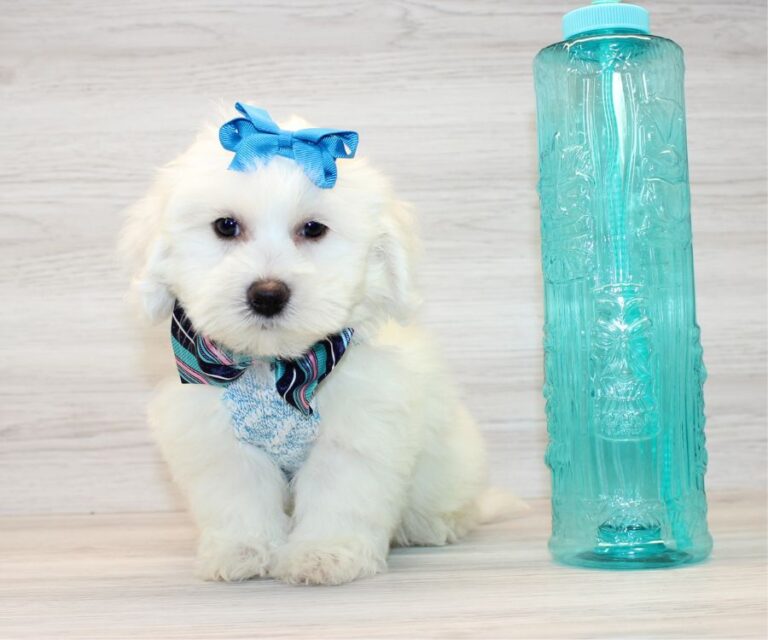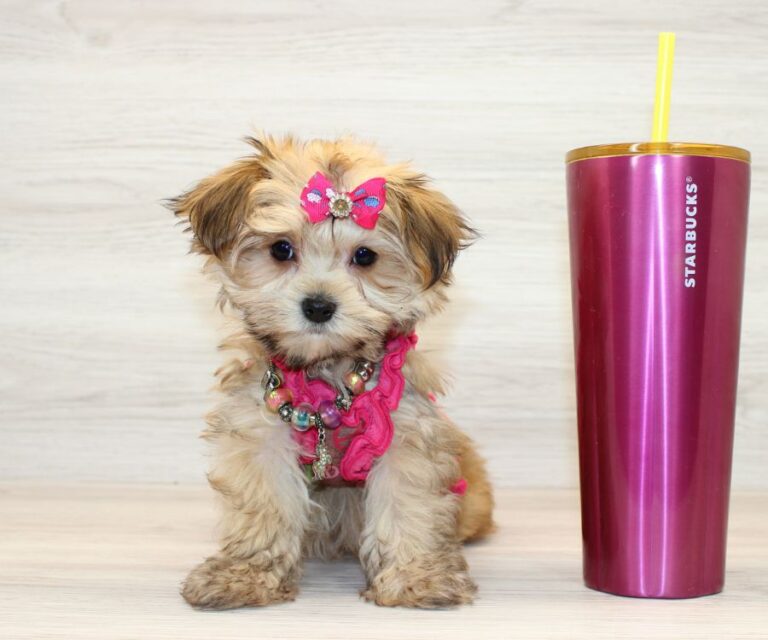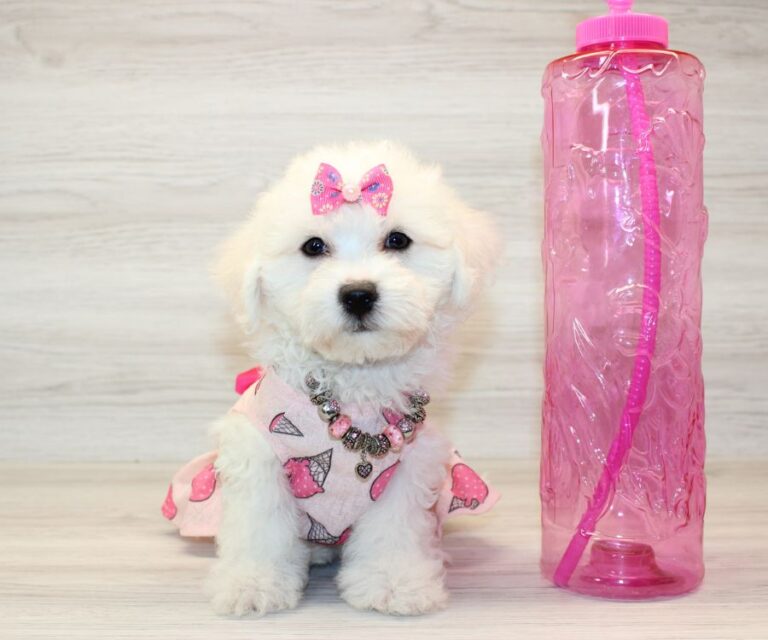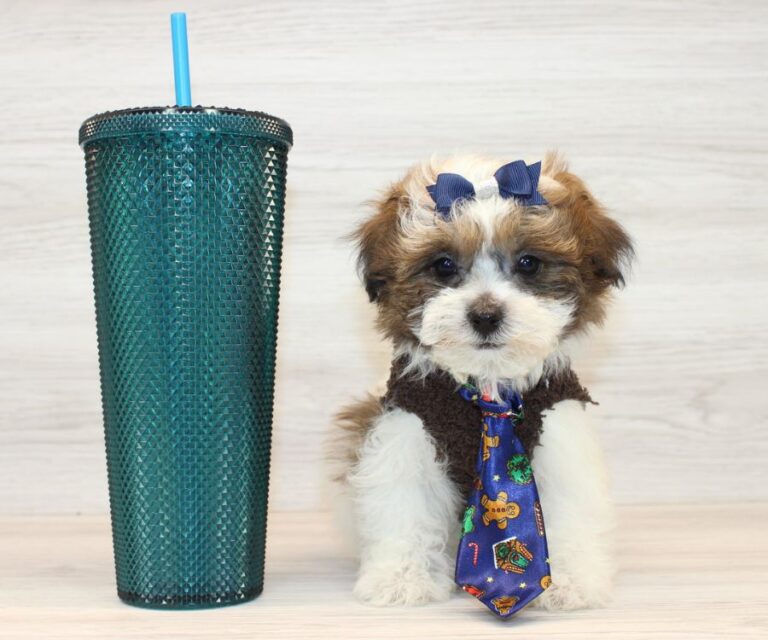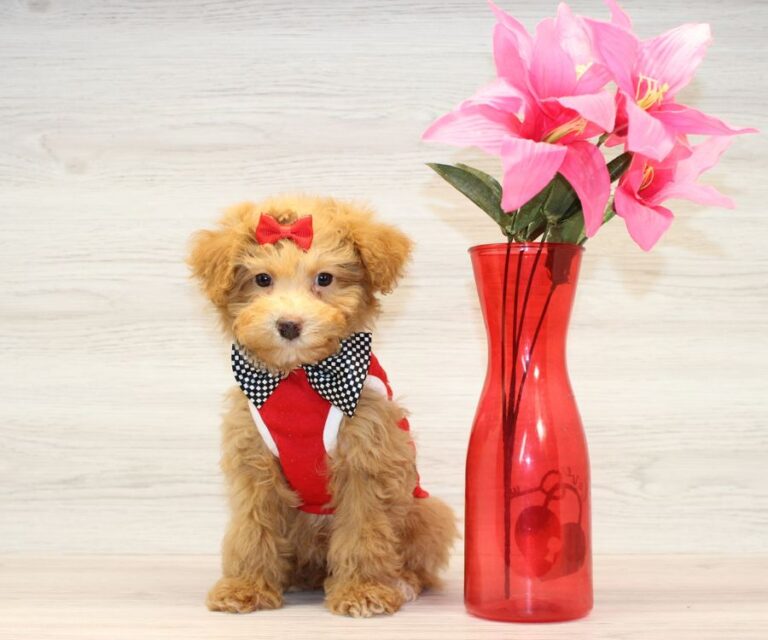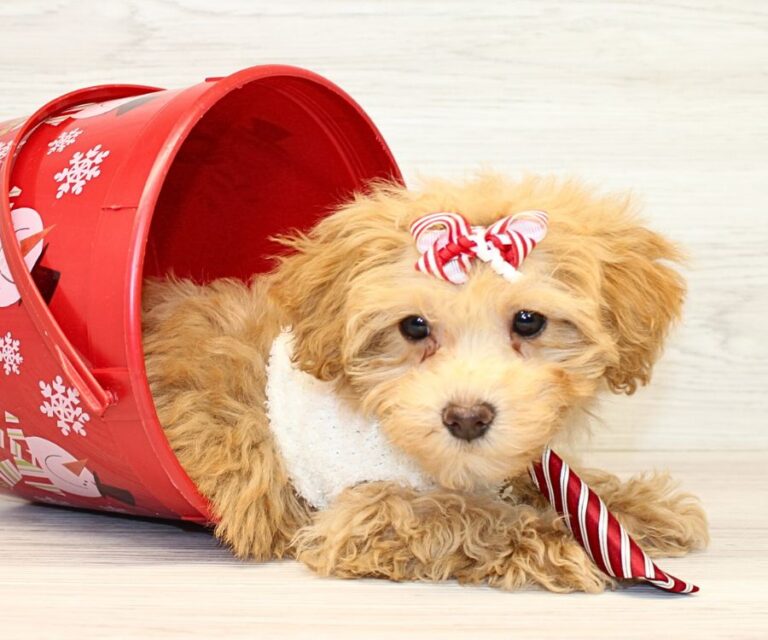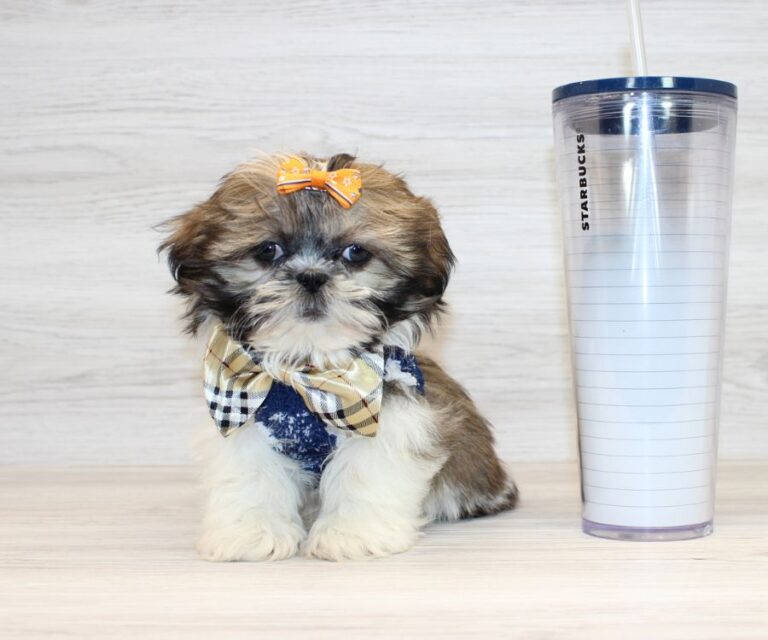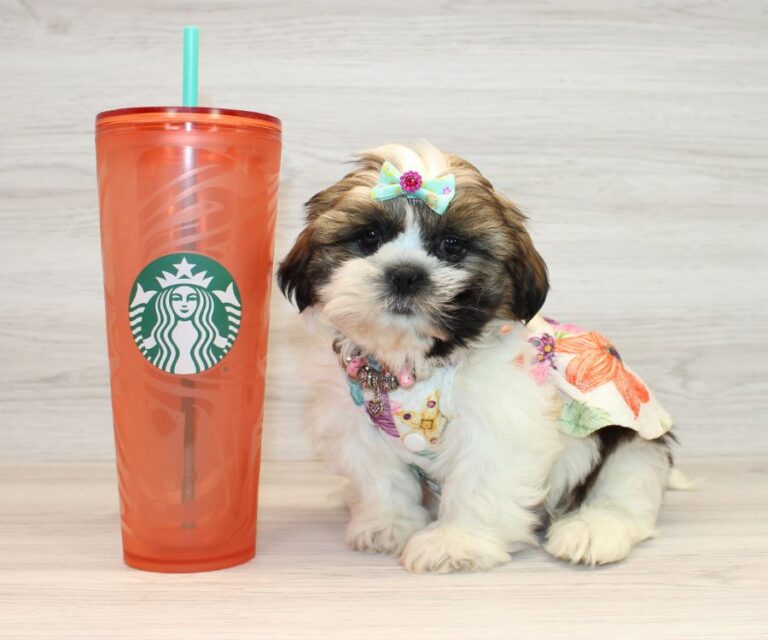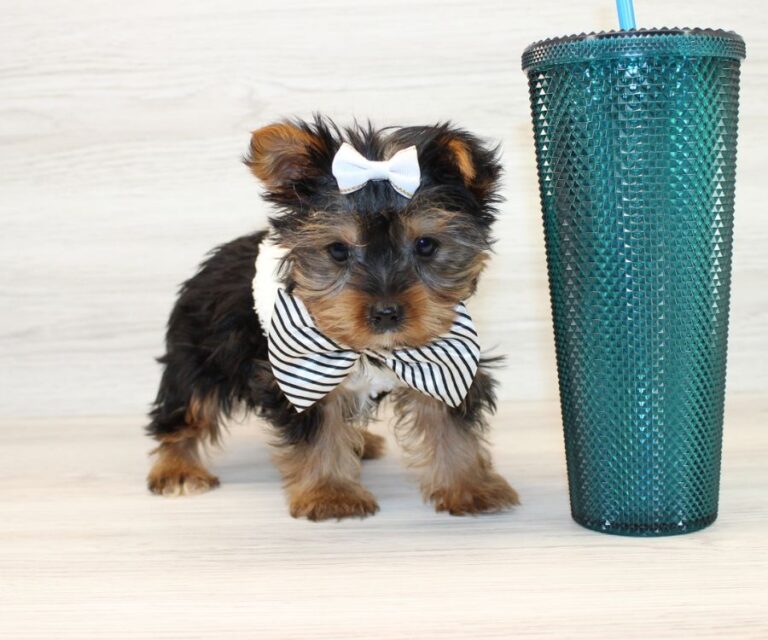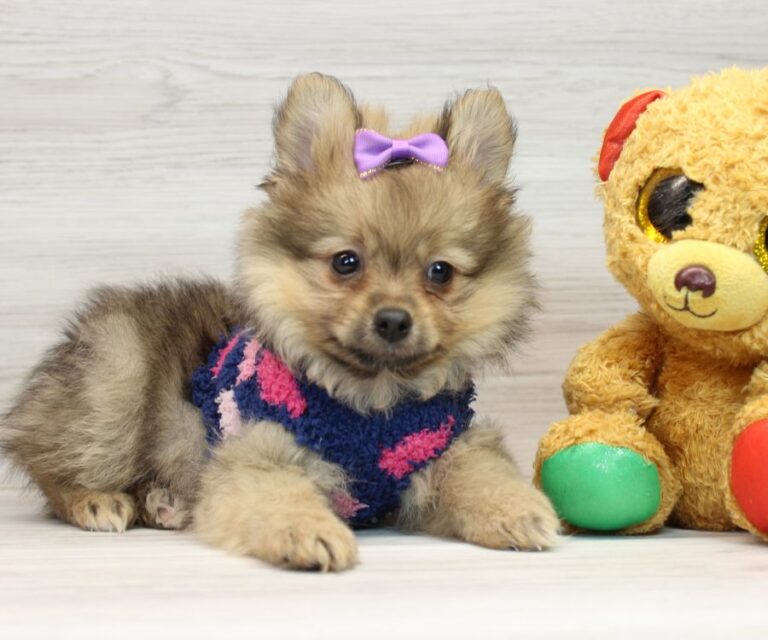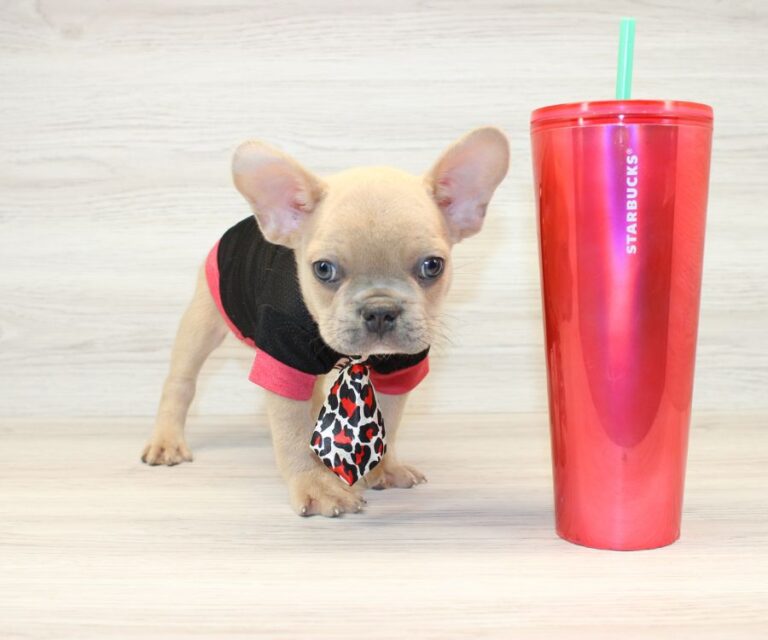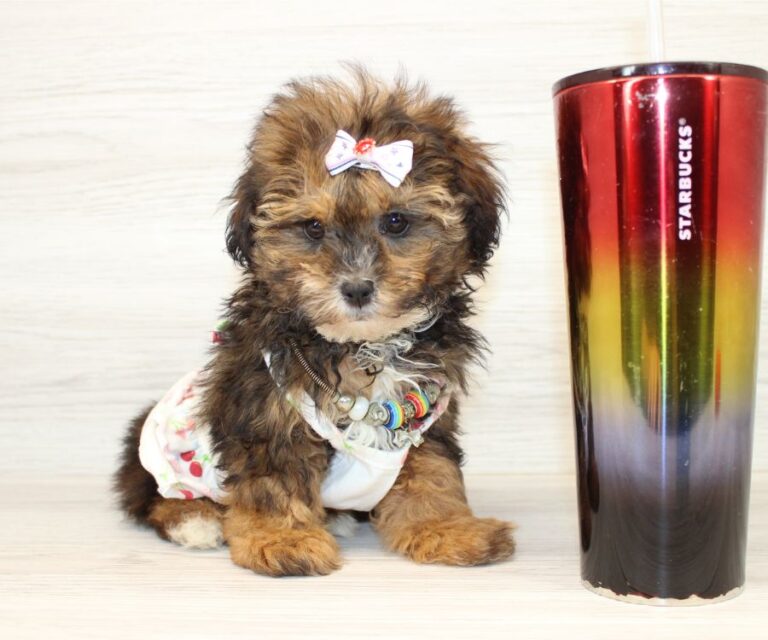At Puppyheaven.com in Vernon, TX, you’ll find a variety of toy and teacup puppies ready to become your perfect companion. These tiny breeds are ideal for apartment living but do require gentle care and constant supervision. Start their socialization and training early, using short sessions with positive reinforcement. It’s important to begin their vaccination schedule by six weeks with vaccines for parvovirus, distemper, and hepatitis. Regular health check-ups and genetic screening are essential to guarantee your puppy’s long-term well-being. High-quality, small-breed dog food is recommended to meet their dietary needs. Learn more about each breed’s unique characteristics and care needs to find your ideal match.
Choosing Your Perfect Puppy
Selecting the right puppy involves considering both the breed’s characteristics and your lifestyle to guarantee a perfect match. When eyeing toy and teacup puppies, you must weigh the breed size and its implications. Smaller breeds, like those you’re considering, typically adapt well to apartment living and require less space. However, their diminutive size also demands gentle handling and vigilant supervision to prevent injuries.
Puppy socialization is another critical aspect. It involves exposing your new puppy to a variety of people, environments, and other animals to make sure they grow up to be well-adjusted and sociable. For toy and teacup puppies, early socialization is vital due to their vulnerability and tendency to be timid or fearful if not properly socialized.
You’ll need to dedicate time to train, nurture, and socialize your puppy, which not only enhances their trust but also builds a strong bond between you. Always remember that your commitment to providing a nurturing environment plays a pivotal role in the development of your puppy’s temperament and health. By aligning the breed’s needs with your ability to meet them, you’re on your way to a rewarding companionship.
Health and Vaccination Info
When you select a toy or teacup puppy, it’s important to understand the specific health and vaccination needs of these small breeds. Puppy vaccination protocols guarantee your new pet is protected against common canine diseases from an early age.
Additionally, reputable breeders follow rigorous health screening practices to identify and prevent the transmission of genetic conditions.
Puppy Vaccination Protocols
You’ll need to start your puppy’s vaccination schedule as early as six weeks of age to protect against common canine diseases. Following precise vaccine schedules is essential in safeguarding your pet’s health. Typically, puppies receive a series of shots that include vaccines for parvovirus, distemper, and hepatitis.
It’s also important to understand the immunization risks, such as mild fever or allergic reactions, which are rare but worth monitoring. Continue these vaccines every three to four weeks until your puppy reaches about 16 weeks of age. Each vaccine plays an important role in preventing serious health issues, and adhering to this schedule is fundamental in ensuring your puppy grows into a healthy, happy dog.
Always consult with your vet for the best advice tailored to your puppy’s needs.
Health Screening Practices
Beyond vaccinations, regular health screenings are vital to detect and manage potential health issues in your puppy early on. As a responsible puppy owner, you’ll want to make sure that your teacup or toy puppy undergoes thorough health checks. These include genetic testing, which plays a crucial role in preempting hereditary conditions that could impact your puppy’s quality of life.
Breeder transparency about these health screenings is equally important. You should expect full disclosure of any tests and results conducted on your puppy and its lineage. This transparency helps you understand the health background of your puppy, guiding you in providing the best care possible.
Training Tips for Small Dogs
Training small dogs requires patience and consistency, as their attention spans and energy levels can greatly influence their learning process. Understanding the importance of socialization and the role of positive behavior reinforcement can make a significant difference. It’s vital to start training early to mold their personalities and behaviors in a positive direction.
Here are some key tips to effectively train your toy or teacup puppy:
- Start Socialization Early: Introduce your puppy to various people, pets, and environments to boost their confidence and reduce future anxiety.
- Keep Training Sessions Short: Their small size and limited attention span mean short, engaging sessions are more effective.
- Use Positive Reinforcement: Reward good behavior with treats, praise, or playtime to encourage repetition.
- Be Consistent: Make sure everyone in your household follows the same training rules and commands to avoid confusing your puppy.
- Focus on Basic Commands: Teach essential commands like ‘sit’, ‘stay’, ‘come’, and ‘no’. This not only improves behavior but also enhances your bond.
Puppy Nutrition Guidelines
Proper nutrition is essential for your toy or teacup puppy’s growth and overall health. It’s important to establish a consistent feeding schedule that suits their small size but high energy demands. Typically, puppies under six months should eat three to four small meals a day. As they grow, you can gradually reduce this to two meals per day.
Always choose high-quality dog food specifically formulated for small breed puppies. These foods contain the right balance of proteins, fats, and carbohydrates to support their rapid growth without causing obesity. Pay attention to the feeding instructions on the dog food package; overfeeding can be just as harmful as underfeeding.
Monitoring for food allergies is also crucial. Signs of an allergic reaction can include itching, digestive upset, or respiratory distress. Common allergens include chicken, beef, soy, and wheat. If you suspect your puppy has a food allergy, consult your vet for an allergy identification test and advice on hypoallergenic diets.
Understanding Breed Personalities
While understanding your puppy’s nutritional needs is important, familiarizing yourself with the unique personality traits of their breed can greatly enhance your relationship with them. Each breed carries a distinct set of characteristics shaped by their breed history, which can profoundly influence their social temperament and how they interact with you and others.
Knowing these traits in advance can help you better serve their emotional and social needs, creating a more harmonious living environment for everyone involved. Here are some key aspects to take into account:
Breed History: Understanding the historical purpose of your puppy’s breed can provide insights into their behavior. For instance, terriers are bred for hunting and may have a higher energy level and prey drive.
Social Temperament: Some breeds are naturally more sociable or reserved. For example, Golden Retrievers are known for their friendly nature, whereas a Shih Tzu might be a bit more aloof with strangers.
Activity Requirements: Each breed has different exercise needs. A Dachshund will require less intense activity compared to a Jack Russell Terrier.
Training Compatibility: Breeds like Border Collies are highly trainable, which is ideal if you’re looking for a challenge.
Health Considerations: Some breeds might be predisposed to certain health issues, impacting their behavior and care needs.
Preparing Your Home
Before confirming your new puppy home, it’s important to make sure your living space is safe, accommodating, and ready to meet their specific needs. Start with safety proofing your home to create a secure environment. Remove any small objects that could be swallowed, secure loose wires, and make sure that all harmful substances, including certain plants, are out of reach. Install gates if necessary to restrict your puppy’s access to certain areas.
Additionally, conduct allergy checks to guarantee the health and comfort of everyone in the household. This involves evaluating family members for potential allergic reactions to pet dander. It might be necessary to arrange particular areas of the house to better suit those with sensitivities, such as keeping the puppy out of certain bedrooms.
You’ll also want to create a welcoming space for your puppy. Set up a cozy sleeping area with a soft bed and provide toys that are safe and size-appropriate for toy or teacup breeds. Keep food and water dishes accessible and make sure they’re the right size for your puppy to prevent strain.
Conclusion
You’re on the brink of adding a toy or teacup puppy from PuppyHeaven.com in Vernon, TX to your family! Remember to choose a pup that complements your lifestyle and personality.
Make sure they’re up-to-date on vaccinations for a healthy start. Training them early will help manage their spirited nature, and essential nutrition is vital for their tiny frames.
Finally, prep your home to make it a safe haven for your new furry friend. Enjoy the journey with your delightful companion!

